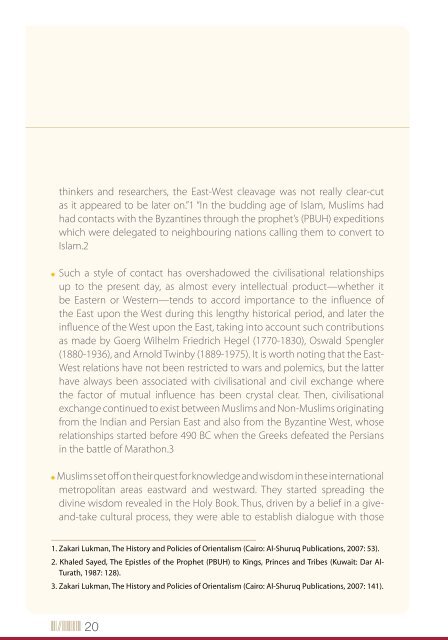General Supervisor
General Supervisor
General Supervisor
Create successful ePaper yourself
Turn your PDF publications into a flip-book with our unique Google optimized e-Paper software.
thinkers and researchers, the East-West cleavage was not really clear-cut<br />
as it appeared to be later on.”1 “In the budding age of Islam, Muslims had<br />
had contacts with the Byzantines through the prophet’s (PBUH) expeditions<br />
which were delegated to neighbouring nations calling them to convert to<br />
Islam.2<br />
Such a style of contact has overshadowed the civilisational relationships<br />
up to the present day, as almost every intellectual product—whether it<br />
be Eastern or Western—tends to accord importance to the influence of<br />
the East upon the West during this lengthy historical period, and later the<br />
influence of the West upon the East, taking into account such contributions<br />
as made by Goerg Wilhelm Friedrich Hegel (1770-1830), Oswald Spengler<br />
(1880-1936), and Arnold Twinby (1889-1975). It is worth noting that the East-<br />
West relations have not been restricted to wars and polemics, but the latter<br />
have always been associated with civilisational and civil exchange where<br />
the factor of mutual influence has been crystal clear. Then, civilisational<br />
exchange continued to exist between Muslims and Non-Muslims originating<br />
from the Indian and Persian East and also from the Byzantine West, whose<br />
relationships started before 490 BC when the Greeks defeated the Persians<br />
in the battle of Marathon.3<br />
Muslims set off on their quest for knowledge and wisdom in these international<br />
metropolitan areas eastward and westward. They started spreading the<br />
divine wisdom revealed in the Holy Book. Thus, driven by a belief in a giveand-take<br />
cultural process, they were able to establish dialogue with those<br />
1. Zakari Lukman, The History and Policies of Orientalism (Cairo: Al-Shuruq Publications, 2007: 53).<br />
2. Khaled Sayed, The Epistles of the Prophet (PBUH) to Kings, Princes and Tribes (Kuwait: Dar Al-<br />
Turath, 1987: 128).<br />
3. Zakari Lukman, The History and Policies of Orientalism (Cairo: Al-Shuruq Publications, 2007: 141).<br />
20<br />
civilisations through translating into and from Arabic, via the Assyrian<br />
language or directly from Persian, Indian or Greek, as recorded in this area of<br />
civilisational contacts.1<br />
Nonetheless, such a positive and dynamic interpretation of this style of<br />
cultural relations between the Orient and the Occident, along with the<br />
efforts of those supporting the thesis of cultural coexistence between the<br />
Orient and the Occident, are paralleled nowadays with the emergence<br />
of certain extremist intellectual contributions which itch old injuries to<br />
perpetuate the logic of the Crusades nowadays. An illustration of this is the<br />
declarations of the Serbia Minister of Information during the Bosnian crisis<br />
when he said, “We are the avant-garde of the neo-Crusades.”2 Nevertheless,<br />
“the efforts of reverse acculturation have been considerably revived during<br />
the last half century, which is so beneficial to the dialogue of civilisations<br />
when confirming the interactivity in terms of civilisation amongst all the<br />
races, the peoples, and the nations of the world”.3<br />
Such extremist intellectual contributions are characterised by generalisation<br />
as regards the West, including the near West, and Germany from the Middle<br />
West, who have no proven record of exerting any clear pressure or assuming<br />
any visible role in the Crusades or during the colonisation era, compared to<br />
what was performed by the rest of the Mid-Western countries (i.e. Western<br />
1. Mohamed Abdelhamid Al-Hamd, Dialogue between Nations: The History of Translation and<br />
Creativity in the Arab and Assyrian Communities (Damascus: Dar Al-Mada, 2001: 531).<br />
2. Mahdi Rezkullah Ahmed, “Missionary Campaigns in the Islamic World: Its Goals and Programmes”;<br />
Special issue: Arab World; The Sudan, Egypt, Iraq, and Algeria as Case Study In Al-Bayen wa<br />
Mabarratu Al-Aamel Al-Khayria, Proceedings of the Conference on Glorifying the Restrictions of<br />
Islam (Kuwait, 2007: 317-388).<br />
3. Abdullah Abu Heif, Acculturation and Reverse Acculturation in Orientalism: The Influence of Arab-<br />
Islamic Culture as Case Study (Al-Kalima, 50.13, Winter 2006).<br />
21


